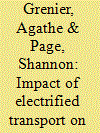| Srl | Item |
| 1 |
ID:
115662


|
|
|
|
|
| Publication |
2012.
|
| Summary/Abstract |
This study examines the impact on the local electricity grid should electric vehicles (EVs) or a light rail transit (LRT) system be introduced to the city of Christchurch, New Zealand. Spatial analysis highlighted that EV owners would not be evenly distributed throughout the city, and the initial stages of a proposed LRT network would cover only a limited area. Therefore, a few local power substations would have to provide the majority of additional power for both electric transport modes. Without management of EV charging patterns, one of the local substations would be overloaded if more than 2.6% of the Christchurch light vehicle fleet were EVs. The power demand from a LRT system would not overload the local grid given current demand levels. However several substations would need an upgrade 4 years earlier than current plans.
A comparative analysis shows that despite the power demand from an EV fleet being higher than the demand from a LRT system (on a equal passenger kilometre per day basis), demand side management methods would allow shifting EV charging off peak time whereas a LRT system would still contribute significantly more to peak load.
|
|
|
|
|
|
|
|
|
|
|
|
|
|
|
|
| 2 |
ID:
090037


|
|
|
|
|
| Publication |
2009.
|
| Summary/Abstract |
Current energy research investment policy in New Zealand is based on assumed benefits of transitioning to hydrogen as a transport fuel and as storage for electricity from renewable resources. The hydrogen economy concept, as set out in recent commissioned research investment policy advice documents, includes a range of hydrogen energy supply and consumption chains for transport and residential energy services. The benefits of research and development investments in these advice documents were not fully analyzed by cost or improvements in energy efficiency or green house gas emissions reduction. This paper sets out a straightforward method to quantify the system-level efficiency of these energy chains. The method was applied to transportation and stationary heat and power, with hydrogen generated from wind energy, natural gas and coal. The system-level efficiencies for the hydrogen chains were compared to direct use of conventionally generated electricity, and with internal combustion engines operating on gas- or coal-derived fuel. The hydrogen energy chains were shown to provide little or no system-level efficiency improvement over conventional technology. The current research investment policy is aimed at enabling a hydrogen economy without considering the dramatic loss of efficiency that would result from using this energy carrier.
|
|
|
|
|
|
|
|
|
|
|
|
|
|
|
|